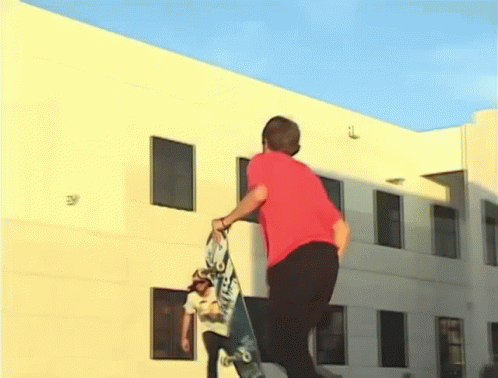If You Ain't Falling, You Ain't Trying: How Skateboarding Teaches You to Improve at Anything

Plenty has been said about what skateboarding teaches and how it transfers to other parts of life.
But it’s worth reiterating – how wildly useful I’ve found it carrying over into my work and even personal life. Namely, teaching you how to approach failure.
The Voltaire adage, “Don’t let perfect be the enemy of good.”, comes to mind constantly. It’s the idea that if I can’t be perfect – maybe it’s picking up the guitar or starting to distance run – that I shouldn’t have ever tried it or I’ve failed in some way.
With skateboarding, perfect is hardly even an option. No one has ever snapped a perfect kickflip the first time they stepped onto a board. It’s literally never happened, ever, not even for a pro.
Here’s how it actually works: you make thousands of attempts that aren’t even close, followed by one sloppy (yet beautiful) land – and then back to missing again.
(As a side note, it cracks me up when I land one really cleanly and think to myself, “Oh I just need to do it like that every time this is easy” and then proceed to make it look like I’ve never set foot on a board.)
It’s a process. It gets better over time. The kickflips get a little more consistent, a little higher, little faster, a little smoother…but it takes a lot of practice even if you’re a natural.
Yet, that’s the expectation we put on ourselves for a lot of things in life, especially as an adult – it has to be perfect the first time. Not only that, we put that expectation on other people too, that they have to be perfect! Rather than understanding that it’s a process for them too.
Or, we believe that because we haven’t made a mistake that we are doing a good job – that could be true, but it could also be a total miss!
That’s why I love the expression I first heard when snowboarding, “If you ain’t fallin’, you ain’t tryin’.” If I go a whole day snowboarding and haven’t fallen once, it means I’m not pushing myself and stretching my limits – and that’s the only way I’m ever going to learn, by challenging myself.
Boarding taught me how to not only to accept failure but also seek it out. Because failure means I’m doing something I’ve never done before.
This doesn’t mean being reckless – I can send it off a 40-foot cliff and learn a life lesson real quick.
It means going to the edge of your abilities – enough that you’re challenged and are growing, but not to the point of putting yourself in harms way or hurting your ability to perform that task in the future (the best ability is availability). For instance, if I’m new to running, maybe I jog a mile before I go for the marathon.
Skating gives me steady opportunities to progress, to safely fail. Drop in on a 2 foot ramp, and do that over and over until I’m comfortable. Once I’m locked in, move on to a 3 foot ramp, so on and so forth.
Falling is a constant in skateboarding and it’s easy to get down on yourself – but you develop mental and physical toughness attempting something a thousand times to finally land it once…and here’s the other thing…the payoff is MASSIVE.
That’s the best part. Skateboarding taught me there’s a special kind of happiness on the other side of failure. Setting a goal and having the determination and awareness to see it through the end.
Skating builds confidence that I carry into other parts of my life, because I know that when I fall, it’s not a failure, it’s just a natural part of the process. That’s how anyone gets better.
I should note – falling needs to be accompanied by a degree of self-awareness and incorporating the lesson it’s teaching you into the next attempt. It means you’re committed to improvement and bettering yourself and those around you. Someone who’s falling and making no attempt to learn from their mistakes becomes a bad hang…to say the least.
But when I understand how falling is helping improve my own life, I have a newfound respect for people around me when they come up short – maybe they’re putting themselves out on a limb, trying something they’ve never done before.
It’s a fine balance because, knowing myself, I have very high expectations for my own performance and am careful not to lower my standards…but the whole reason for this post is I’ve found it’s usually the opposite. Being too harsh on myself and others around me, setting the bar unrealistically high. Not stopping to consider that maybe I’m actually a beginner and need to give a little more grace.
The beautiful thing is it’s changed my definition of success. Rather than success meaning I’ve reached a specific goal, it’s about improvement. Progressing just a little bit further from where I was yesterday and compounding those lessons daily.
I’ve come to really love that feeling of improvement, to the point that improvement itself is a driving force in my life.
Now, instead of thinking in terms of landing and falling, I think:
Was I trying something new?
Did I learn something?
Am I going to try it again?
If the answer is yes, that is success.

